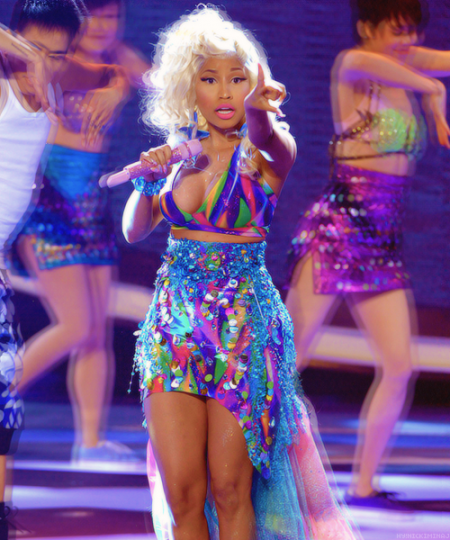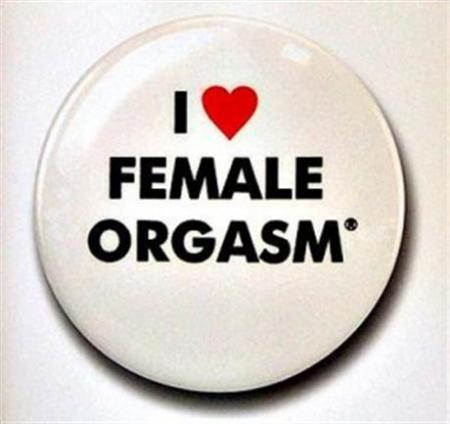Serendip is an independent site partnering with faculty at multiple colleges and universities around the world. Happy exploring!
mbeale's blog

Redesigning Setting the Scene: Reading for Minaj Feminism
For my final project, I would like to focus on our pop culture discussions in the beginning of each class session, or “Setting the Scene.” Our assignments to bring in a pop culture item, usually a music video or a post from the blogging website, Tumblr, as a potential lead in to our intended academic texts and their subsequent dialogues (particularly the ones revolving around music videos) often were cut short—much too short for a satisfying analytic reading of the often multi-faceted material we were presented with. Some classmates suggested we process topics of our discussions prior to class meeting to allow for a more comprehensive reading. However, my qualm did not arise from ability of lack thereof to process what I was seeing, it was the way in which most discussions ended, an ending reminiscent of our “Is this a feminist text?” conundrum: an ending that reached for the shallow aim of finding our own preset definitions of feminism within these three to four minute worlds. I was most disappointed by the feminisms we didn’t see, even flat out ignored, in certain “setting the scene” presentations. Of our discussion of non-conventional feminist music figures my interest was most peaked by our rather curt reading of Nicki Minaj’s video, “Stupid Hoe.” Her overtly sexual and aggressive music video presentation was quickly judged as trite and not worth the time of the class to watch the entirety of.


Teach In
Considering the other student teach-ins, I was extremely dismayed with my own performance. Being a Haverford freshman and therefore unfamiliar with Anne's teaching style and subsequent project structures, I felt as if I misunderstood the project and its intentions. I intended to open discussion that I felt was sparked earlier in the semester about sex work and in that way create an avenue for extending rich conversations that I felt were repeatedly cut short throughout our course time together. By providing a small sampling of pornography throughout the decades slightly before and since the feminist revolution, I hoped that, starting with a few discussion questions, we could continue our questionings of whether of not "feminist pornography" can really exist. I felt attacked at times for not being the absolute authority on knowledge of pornography, which I do not feel I pretended to be at any point. That being said, I had a wonderful experience watching the presentations and seeing the vast creative efforts of everyone in the class. I would like to think of the final performance as a direct way of getting the privelege to see how each of us manifests our ideas of feminism whether it be through zines, interviews, memes, games, or senses. Feminism necessarily creeps into many disiplines and spheres within our lives and these final projects as a whole demonstrated that.

The Gender Frontier
Kate Bornstein, in her Gender Workbook, comments that the transgender rights movement is exceptional in the facts that it has risen up via the internet, making it a uniquely modern age event. Through the new medium of the internet, the transgender movement is quickly picking up resemblance of the momentum of the women’s liberation movement of the 60s era. Both are closely related in their ultimate goal of equality and wanting, despite self- embraced or imposed gendered or sexed designations, to be recognize as persons primarily based on multiplicitous individualities. Another commonality between the women’s liberation movement of the 60s era and the more recent transgender revolution is the necessity politicizing of one’s identity, essentially to make someone’s identity into an issue to bring it to the attention of the greater population.
Better known as “Make the personal political” in the feminist world, it is that which is a response to the “mainstream identity.” The normative population, in an attempt to consolidate themselves as the legitimate identities, use the technique of othering certain groups, such as women and transsexual and transgendered individuals. Photojournalist and author of The Gender Frontier, a photobook largely dedicated to the conversion narratives of transgender persons, Mariette Pathy Allen, says,

We Can't Forget About the Little Boy In Harlem
An annoyance with the text that I neglected to bring up in class is the pure audacity of international humanitarianism. When there are still things being swept under the rug and out of our consciousness like the Trayvon Martin case and this case (http://www.democracynow.org/2012/3/29/killed_at_home_white_plains_ny) of a 68 year old veteran being killed in his home largely on the basis of race, I feel it is blatantly cruel to an extremely marginalized portion of the population within our own country who is in need of justice, much often the same sort of justice aid groups like Half The Sky go peddling and pandering support for all around the world. James Baldwin, a civil rights activist mostly active in the 60s, expressed a similar concern in critique of sprouting aid initiatives like the Peace Corps, "We can't forget about the little boy in Harlem." Instead of solely being conflicted on whether or not to poke one's head into another culture's and country's problems, perhaps it is time we take time to assess the mirroring issues on our own turf.

A Mustachio-ed 2nd Grader
To be honest, I can't remember the first time I felt "gendered," it's a difficult moment to pinpoint in my life. I was told I was a "little girl" then a "big girl" then a "teenaged girl" then a "young woman," and I've come to accept this sort of consistency without much question or consternation. The earliest memory I have that I would account to being clearly defined by gender is in 2nd grade. It was lunch time. We had just gotten the KidPix computer game in the classroom. A boy I had a crush on and some of his less remarkable friends were fooling around with it and I wasn't very interested until I saw my Leah, one of my best friends, red in the face and sobbing. Someone said it had something to do with what Ryan, the boy I liked, and his friends were doing on the computer. I went over to look at what would upset Leah so much and I saw it: A little cartoon that slightly resembled her with a handle bar mustache paired with the title 'Sir Leah.' Oh dear. This was unquestionably offensive! Girls were not supposed to have facial hair! Let alone fully developeed mustaches! And Leah did have a weirdly fuzzy upper lip...But that was besides the point! Her girlhood was being questioned and the fellow sisters of Sister Theresa Mary's homeroom were not going to stand for it. We waged a brutal playground war against the boys that day. And by doing so, we proved that Leah was still a girl and she did not and would not ever have something as despicably un-girly as a mustache.

What I Would Have Said: How I Found Out Jesus Did Me A Huge Favor
The Easter story has been hammered into my brain since I was about 5 or 6 by everyone from my mother to the temperamental nuns who were responsible for my education. It was told to me in a way that I would never hope to understand, and thinking back on it, purposefully so: the mystical benevolent, scruffy haired godman with impeccable taste in white linens and a blinding golden aura reduced himself to a horrifying and humiliating unique punishment, died, went hand to hand combat with the devil, came back to life, walked around town and freaked out his friends, and flew into the heavens, having saved us all for infinite generations to come. Whatever the story, this meant I was not allowed to eat jellybeans for a month or say Hallelujah. Ever since I can remember, I attended solemn masses that reeked of incense and smoke, while the congregation hollered, "Were you there when they crucified my Lord?" Well, no, I indeed was not. In all actuality, the Easter holds little bearing on the sanctity of my soul as Jesus may have so earnestly intended. Being older, the Easter story is now more appealing to me as a special on the History Channel. I think less about Christ's mysterious powers and more about how crucifixtion was a common although vulgar punishment inflicted by the Romans and that the the successful "cross" was really a "T." I must say, that from a literary standpoint the Easter story, especially in the King James Biblical version, is an easily appreciable work of artful persuasion.

Is There Room for Feminism in Global Economics?

Watch Who’s Counting?: Marilyn Waring on Sex, Lies, and Economics Here :
http://www.nfb.ca/film/whos_counting
At the spectacle of rapidly expanding, nation interlacing sphere of globalism, the concept of an inclusive worldwide economy hardly seems like a digestible one. According to Marilyn Waring, however, because it specifically seeks not to be.
About Waring— 

My Discomfort with Born into Brothels--and Perhaps the Activist Documentary Form in General
When I first checked out a film called Born Into Brothels from the library I immediately felt anxious about its point of view, and from skimming the DVD cover that read in bold-faced text, "Uplifting!", that sentiment did not seem like it was going to change. Not to say that I didn't appreciate a chance to look into the lives of a group of young children that frankly, it had not occurred to me existed--it was that the documentary seemed to so determinedly manipulate what little access I was being given into that of a role I was not free to pick.



